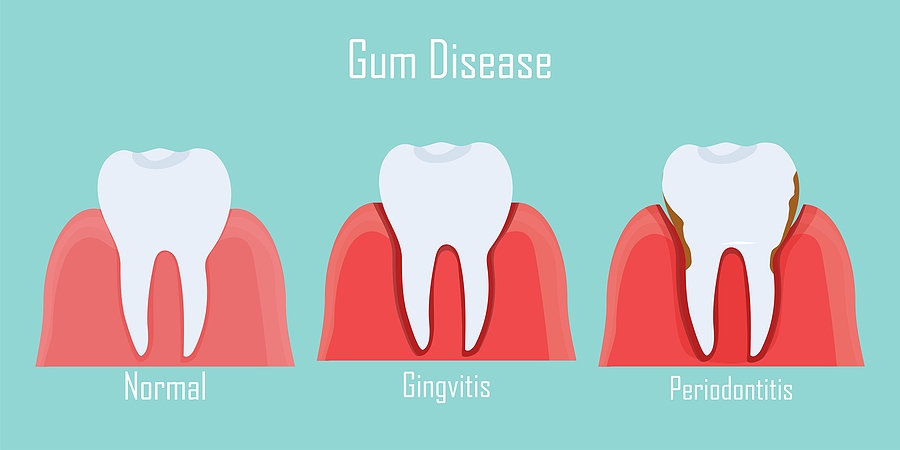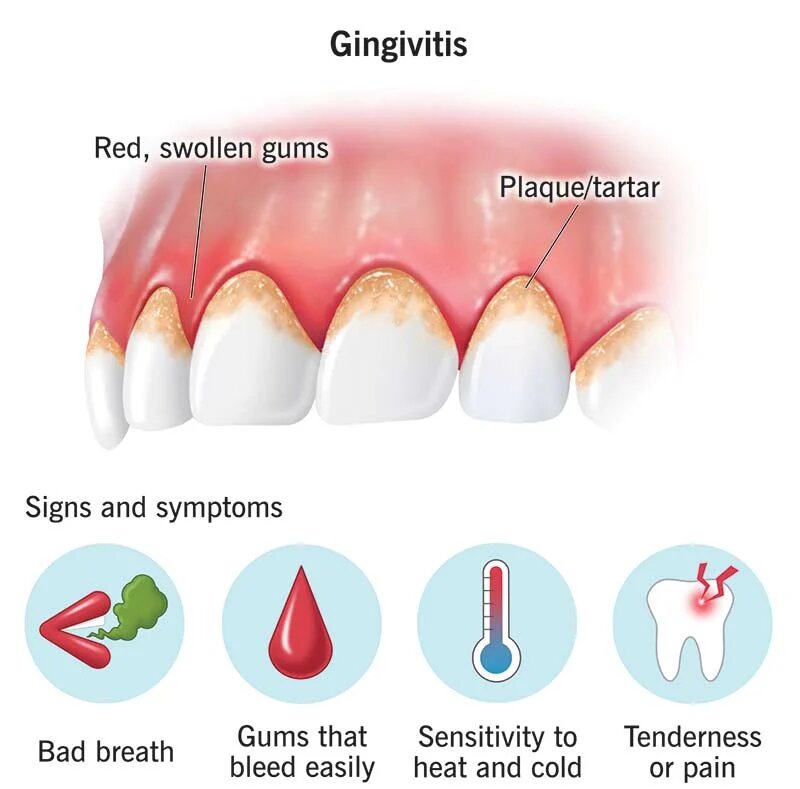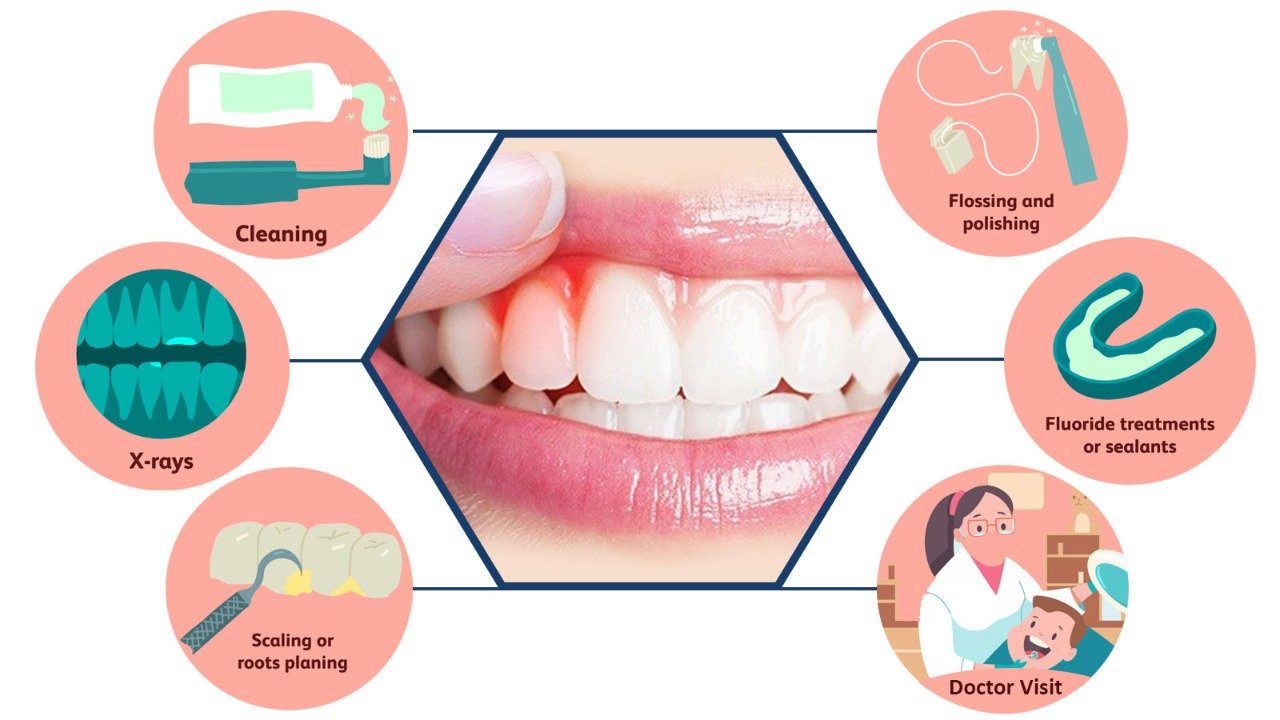Gum disease (also known as periodontal disease) affects nearly half of all people over age 30, and it’s the leading cause of tooth loss among older adults. Emerging research also suggests that gum disease has far-reaching impacts on the human body, potentially playing a role in the development of over 120 different health conditions. By raising awareness about the link between gum disease and systemic diseases – and encouraging prevention – having good dental health may be key to lowering rates of cardiovascular disease, diabetes, and cancer, among other ailments.
Table of Contents
What is Periodontal Disease?
Periodontal disease is a chronic condition characterized by the inflammation and infection of the gums, ligaments, and bone that supports the teeth. Gum disease begins when bacteria from the mouth infiltrate gum tissue, usually as a result of plaque accumulation below the gum line. If left untreated, it can lead to serious complications, including tooth loss, worsening infection, and damage to the jawbone.
The earliest stage of periodontal disease is called gingivitis, a superficial infection that causes the gums to become red and swollen, feel tender, and bleed easily. If gingivitis progresses, it can develop into periodontitis, where the infection and inflammation spread to the deeper tissues and bone surrounding the teeth. Periodontitis can cause the gums to recede, create pockets between the gums and teeth, and weaken the ligaments and bone that hold the tooth roots in place.

Without dental intervention, periodontal disease often causes the teeth around the area of infection to become loose and eventually fall out. The presence of periodontal disease can also complicate tooth replacement because patients must have healthy teeth and gums to be a good candidate for most dental restorations, such as dental implants and bridges.
What are the Symptoms of Periodontal Disease?
Symptoms of periodontal disease may include bad breath, bleeding gums, loose teeth, swollen gums, and changes in bite or tooth alignment. Many people with gum disease also report increased tooth sensitivity (as a result of tooth roots becoming exposed) and pain or discomfort when chewing.

What Causes Periodontal Disease?
Poor oral hygiene is one of the main risk factors for developing periodontal disease. Gum disease is particularly common in people who don’t have regular dental exams because professional teeth cleaning is necessary to remove plaque below the gum line, where gingivitis starts. However, habits like smoking, the presence of certain illnesses, hormonal changes, and genetics can predispose some people to gum disease.
Periodontal disease affects overall health
Research has linked gum disease to multiple health conditions, including diabetes, heart disease, Alzheimer’s, asthma, osteoporosis, and cancer. Research from Harvard, for instance, reveals that people with gum disease are two to three times more likely to have a heart attack, stroke, or other serious cardiovascular event than people with healthy gums. Gum disease is also associated with a twofold risk of developing cancer in the kidneys and pancreas in men (American Academy of Periodontology).
While the relationship between periodontal disease and chronic illness is still being explored, scientists believe that irritated, inflamed gums may act as a pathway for oral bacteria to enter the body and spread via the bloodstream. Once established, this bacteria releases toxins, potentially damaging the heart, brain, and other organs and contributing to systemic inflammation. This can make it difficult for people to control their blood sugar levels, increasing the risk of diabetes (or diabetic complications for people with diabetes). Bacteria can also be aspirated into the lungs, worsening inflammation in people with respiratory diseases, such as asthma and COPD (American Thoracic Society).
In addition, periodontal disease can adversely affect pregnancy outcomes. Pregnant women with periodontal disease may have a higher risk of preterm birth and low birth weight babies.
Treatment of Periodontal Disease
Given the potential health impact of periodontal disease, it’s essential to maintain good oral hygiene practices and seek routine dental care. In addition to daily brushing and flossing, having a dental exam (and cleaning) every three to six months is critical to the prevention and management of gum disease. Regular dental check-ups allow your dentist to monitor the condition of your gums, ensuring problems are detected and treated early.
Periodontal treatment generally involves a combination of dental care, improved self-care, and lifestyle modifications. The goal of treatment is to control the infection, reduce inflammation, and prevent further damage to the gums and supporting structures.

For gingivitis, the mildest form of gum disease, treatment may be as simple as improving brushing and flossing habits and increasing the frequency of dental cleanings, along with targeted lifestyle modifications like smoking cessation.
In the advanced stages of gum disease, scaling and root planing are typically used to remove plaque and tartar below the gumline and encourage damaged tissues to heal. These procedures may be done using hand instruments, ultrasonic devices, or lasers, depending on the needs of the patient. Dental scaling clears away plaque from deep below the gum line, while root planing smooths the root surfaces to help prevent further plaque and tartar buildup and promote gum attachment to the teeth. After the deep cleaning of the affected area, oral or topical antibiotics may be prescribed to help control the infection and reduce inflammation.
In severe cases of gum disease, surgical procedures (such as flap surgery, bone grafts, and tissue grafts) may be performed to repair or regenerate damaged bone and gum tissue.
Preventative Measures
As the holiday season approaches, it’s especially important to keep the prevention of gum disease in mind. Not only does the consumption of sweet, sticky foods and alcohol increase over the holidays, but people are also more likely to neglect their oral hygiene due to distraction and fatigue. This combination of factors can cause gingivitis and periodontitis to worsen rapidly, making treatment more challenging and time-consuming.
To prevent gum disease this holiday season, take the following steps:
- Brush your teeth twice daily using a soft nylon toothbrush and floss daily to remove plaque and food particles trapped between the teeth. Brush for at least two minutes using gentle but firm circular motions.
- After brushing and flossing, rinse your mouth with an antimicrobial mouthwash to kill the bacteria that cause gingivitis.
- Stop smoking (if you smoke) and avoid excessive alcohol consumption. Cigarette smoke and alcohol irritate and dehydrate oral tissues, making it easier for bacteria to infiltrate the gums. They also promote inflammation and interfere with healing, creating ideal conditions for gum disease.
- Eat a healthy diet low in sugar and high in fruits and vegetables to reduce inflammation and plaque buildup.
- Visit a dentist for regular exams and cleanings. Receiving professional cleanings is necessary to remove plaque and tartar below the gum line, which cannot be removed with brushing and flossing alone.
Though periodontal disease is one of the most common oral health conditions, it’s also one of the most preventable. Ask your dentist about ways to prevent gum disease at home, and don’t neglect regular dental checkups, particularly if you notice early signs of gum disease. In most cases, seeking timely treatment can prevent and reverse gum disease before it causes significant damage.
Conclusion
Periodontal disease is more than just a dental concern; it’s a systemic health issue that can affect every part of the body, with potentially devastating consequences. Fortunately, treating gum disease in its early stages is painless, convenient, and very affordable. Making your oral health a priority with routine dental care is one of the easiest ways to safeguard your overall wellness and live a longer, fuller life.
If you have questions or concerns about gum disease, don’t hesitate to reach out to our Mississauga dental clinic. As a leading oral surgeon and periodontal specialist, Dr. Oscar Dalmao can help you reduce your risk of gum disease or treat existing disease using the latest minimally-invasive technology.
This holiday season, give yourself the gift of healthy teeth and gums: Contact Dr. Dalmao today to arrange your next dental exam.


